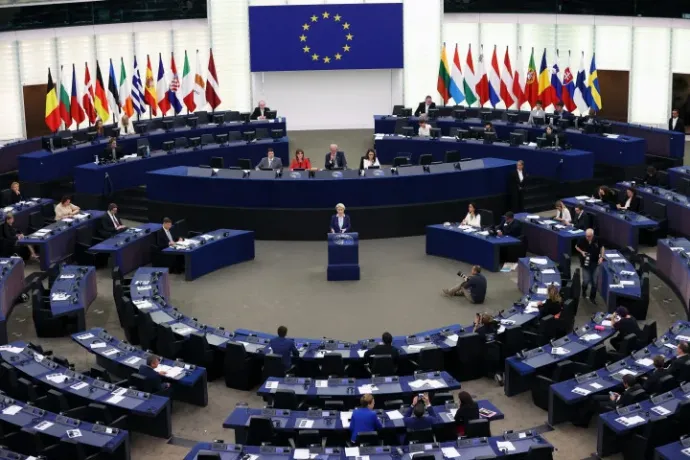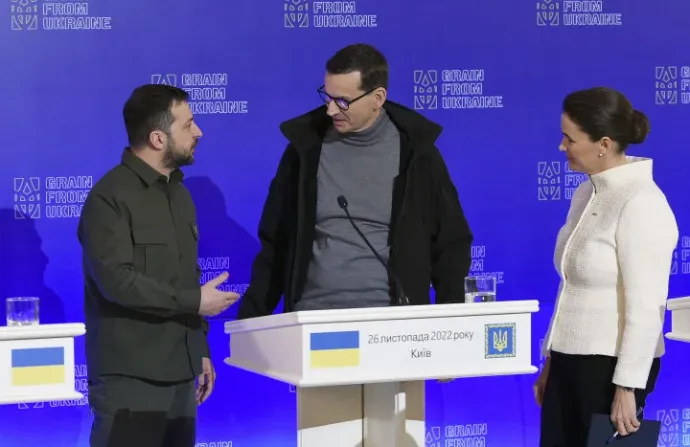
After a serious slump, the once close relationship between Budapest and Warsaw appeared to be on the mend, but Polish voters threw a wrench into this on Sunday. A few years back, Donald Tusk, who is now the most likely candidate for prime minister, played a key role in pushing Fidesz out of Europe's biggest political family. As a result, the Hungarian leadership could find itself alone or in a weakened position with just the Slovaks on their side on a number of issues on the EU stage, from the Ukrainian grain dispute to the disagreements on asylum and rule of law issues, to the questioning of the foundations of EU law.
Sunday's election results suggest that Poland will replace its governing parties, ending the eight-year reign of the Law and Justice (PiS). PiS may have come out on top, but it lost dozens of seats in parliament, leaving it without enough MPs to govern, even with its potential far-right ally. Additionally, the pro-EU opposition has won enough seats to secure a majority in the lower house.
It is possible that the head of state, who has ties with Jarosław Kaczyński's party, will give PiS the mandate to form a government first, but the multi-party Civic Coalition (PO), which came second, has a realistic chance of joining forces with the Third Way (TD) and the New Left to give them the majority they need. Together they would have 249 MPs in the 460-seat lower house.
In this case, the Hungarian government could lose its strongest EU ally in the debate over the rule of law and EU funds, even if relations between the two governments have grown frostier over the past year and a half due to differing views on the war between Russia and Ukraine. If the new government is formed by the members of the Civic Coalition, it is likely to seek to settle its relationship with Brussels. After all, it would have a head of government who used to be President of the European Council until 2019 and then of the European People's Party (EPP) – which once included Fidesz – until 2022.
"If PiS doesn't continue to govern", it will not only be bad for the Visegrád cooperation, “but could also damage relations between the two countries and put Hungary in a vulnerable position in European politics.”
– ATV quotes Hungarian Deputy Foreign Minister Levente Magyar as saying on Sunday evening, prior to the arrival of the exit poll results, which already signalled that PiS would not have a majority.
European Commission Vice-President Margaritis Skinas however was elated, or so it seemed to the BBC correspondent when he spoke to him about the exit poll results. The Greek politician hoped that the expected change of government would ease tensions with a "central member" of the European family. German centre-right MEP Katja Leikert was particularly pleased on X (formerly Twitter), saying the pro-European result was of huge significance.
Sławomir Domaradzki, a political analyst at Warsaw University, on the other hand, warned that "the current opposition's expected rise to power does not mean that Warsaw's position would dramatically change on several key issues", as anticipated by the EU institutions.
Won’t the V3 come together?
In the summer, Prime Minister Viktor Orbán said that the Czechs had already "switched sides", but just a few weeks ago, following the election of Robert Fico in Slovakia, it looked as if the Visegrád Four might become more united. The populist politician had clashed with the Hungarian government several times during his previous term in office, but Hungarian Foreign Minister Péter Szijjártó had good reason to be pleased with the victory of the pro-Russian, anti-migrant and Soros-criticizing politician. Although his party, Smer, is seemingly among the Fidesz-opponent European Socialists, it has already been suspended, and Fico and his party do not seem to be bothered by this. They seem to have started down a slope similar to the one at the bottom of which Fidesz found itself when they left the centre-right European People's Party.
At the time of Fidesz' split with the EPP, Donald Tusk was presiding over the European Parliament's biggest political family. He heads the Civic Platform, the strongest member of the Civic Coalition alliance, which came second on Sunday. When the relationship between Fidesz and the EPP soured, he did not exactly push for keeping Hungary's bigger governing party in their circles. He criticized Fidesz – sometimes implicitly, sometimes quite openly – which had at the time already become friends with his main domestic political opponent, Law and Justice.
“What more does Fidesz have to do to make you all see that they simply don't fit into our family?”
– he asked in December 2020, a few months before the already suspended Fidesz avoided expulsion by leaving. Last year, Donald Tusk campaigned for the Hungarian opposition in Budapest. He led the European People's Party until June 2022, when he returned to the helm of the Polish Civic Platform to seek the post of prime minister once again (after having governed from 2007 to 2014).

With a new Polish government, we can expect a change in Warsaw's conflict-ridden relationship with Brussels, although Tusk will still have his hands full with forging a coalition.
As mentioned above, Fidesz was already close to PiS, Tusk's Eurosceptic opponent, during their time in the EPP. Given PiS' traditionally strong anti-Russian stance, the close friendship has been frayed by the Russian invasion of Ukraine. However, on the dispute over Ukrainian grain imports, the Polish party has gone so far as to claim that the Kyiv government has joined forces with the EU institutions to overthrow them, and migration has also been an issue that brought some healing to the Polish-Hungarian relationship.
When it comes to EU matters, the prospective Slovak-Polish swap won't go down so well for the Hungarian government, if only because of the mathematics of voting. Member states usually take their joint decisions by qualified majority, where the number of countries and the population they represent counts, so a new friend of five million is of no use if a friend of 40 million is bidding farewell.
The Hungarian government may end up alone on rule of law issues
The weight of member states also counts in the rule of law procedure based on Article 7. Such a procedure has been initiated against both Hungary and Poland. In the case of Poland, it was initiated by the European Commission in 2017, and in the case of Hungary by the European Parliament in 2018, but in the years since then, virtually nothing has happened. From time to time, member states hold hearings, but they have failed to either terminate or move the procedure forward. In the case of Hungary, it would now take a qualified majority to get to the next stage, which is now – in principle – more likely to happen.
What could be even more threatening is that at the next stage, which requires unanimity, the possibility of a Polish-Hungarian mutually secured veto is unlikely to be an option at this time. The situation probably won’t escalate to the stage which would follow the next one, but if it does, the Hungarian government might even get Fico to throw in a veto (naturally, the concerned country does not get to vote). Since there is no similar ongoing procedure against Slovakia, this means that something else would have to be offered instead of a veto, and without this, the Article 7 procedure does not seem to be completely without risk for Hungary either.
If the new Polish government were to reach an agreement with the member states and the procedure against it were to be dropped, Hungary would end up alone, and not just on the rule of law, but on the question of the blocked EU funds as well.
Payments for Poland from the 2021-2027 cohesion funding budget have also been blocked – these are the funds from which the Hungarian government is almost completely cut off. Poland will also miss out on money from the one-off recovery fund, which can be drawn down until August 2026, because the Warsaw government, similarly to the Hungarian one, has still not met the necessary milestones, in particular the ones relating to judicial reforms.

During his campaign, Donald Tusk said he would make a deal with the European Commission on the day he took office – thus supporting (whether inadvertently or not) the Polish government's accusations that Brussels was trying to force a change of government by withholding the money. It also might be helpful in restoring Brussels' confidence towards Poland that
unlike the Hungarian government, Tusk and his team intend to join the European Public Prosecutor's Office.
The new Polish government's room for manoeuvre could be limited by possible vetoes from PiS-loyal President Andrzej Duda. These could be particularly difficult obstacles to overcome, given that the expected coalition would not have a three-fifths majority needed for overriding vetoes, while on reforms the European Commission tends to expect more than just proposals or agreements in principle: they want to see adopted laws with details of their implementation.
The debate questioning the foundations of EU law may be settled
The question of judicial independence is one of the European Commission's main concerns in Poland, although the Polish government has been far more ambitious than the Hungarian government in overhauling the system, and the conflict with the EU has also become more pronounced.
After the beginning of the Russian invasion on Ukraine, the Polish government appeared more conciliatory for a while. But EU institutions have pointed out that, despite having reached agreements, the Warsaw leadership has been slow on implementation in some areas. Conflicts have gone as far as pro-government politicians threatening to end cooperation and disrupt joint decision-making.
As part of the milestones, the Polish government will have to partially reverse the changes which have been made to the justice system, which allowed the government to influence the justice system in its favour. A chamber of the PiS-led Constitutional Court was assigned the task of handling judges' disciplinary issues, which the European Court of Justice ruled illegal and imposed a fine of one million euros per day. In response, Prime Minister Mateusz Morawiecki challenged the supremacy of EU law before the Polish Constitutional Court, which in 2021 ruled that the EU's founding treaties were in several points contrary to the Polish constitution.
The relationship between common law and national law could soon come to the fore in Hungary too. Despite the Polish and Hungarian vetoes, the asylum and migration package, several elements of which the Hungarian government opposes, could be adopted by the middle of next year. Hungary has previously refused to implement the transfer of asylum seekers, calling it a "core constitutional issue". The debate on the primacy of EU law has recently been taken the furthest by the Polish government over issues surrounding their judicial reform, but the new Warsaw cabinet many expect is unlikely to stick to this.
Tusk spoke of greed being behind Ukrainian grain dispute
The Polish and Hungarian governments may also part ways over opposing final EU decisions on free agricultural imports from Ukraine. One of the ways the European Union has helped Ukraine after Russia's attack was by facilitating Ukrainian exports by providing solidarity lanes. On the other hand, government representatives have extended a previous free trade agreement to cover a number of agricultural products that were previously subject to import restrictions or duties.

Initially, however, six EU countries complained that their markets were flooded with Ukrainian goods, especially grains. The Czech Republic was first to relent, then Bulgaria and Romania followed, but the Polish government, which had to face protesting farmers in the run-up of the campaign, didn’t join in. Along with Slovakia and Hungary, it imposed unilateral restrictions twice and said it would no longer supply Ukraine with new weapons because of the dispute. Donald Tusk responded by accusing Polish Prime Minister Mateusz Morawiecki of stabbing the Ukrainians in the back, to which President Andrzej Duda reacted by saying that they would continue to supply weapons, but only second-hand ones.
Given the change of government, it is possible that Poland will now accept the Ukrainians' measures to help deal with the impact of their exports. The chances of a deal are boosted by Kyiv's recent suspension of its lawsuit against the countries that imposed unilateral restrictions. Donald Tusk has previously described the Polish government's handling of the dispute as a "chain of incompetence and greed", and in June his party was the only one in the Polish parliament to vote against extending the EU's temporary measure to remove import quotas and tariffs. If, however, the new leadership were to be too compliant, it could face the same farmer protests as its predecessor, with European Parliament elections just over six months away.
Hungary lost a major ally, but a full turnaround on all issues is not likely
A qualified majority is not only important for lawmaking under the normal procedure, although it matters here too (not to mention the fact that in the first half of 2025, Poland will take over leading the co-decision procedure from Hungary). With the EP elections coming up and institutional adjustments likely to take place next June, work on proposals which are still pending may be started again from scratch in some cases while others may be dropped altogether, so the EU institutions are scrambling to pass what they still can.
It is at this important time that the outcome of the Polish election will rebalance member state decision-making, which could make a big difference during votes on more contentious issues, such as the more disputed elements of the asylum and migration package (the Polish and Hungarian Prime Ministers have recently started vetoing the portions related to migration in the conclusions of EU summits, but this has no practical significance anyway.)
As mentioned above, it is expected that Tusk, as the former President of the European Council would lead a centre-right coalition of conservative, liberal and socialist parties and pursue a more pro-EU policy than his predecessor, but it is possible that he won't be much more permissive on issues of asylum and migration. Civic Platform spokesman Jan Grabiec warned that "we will certainly not agree to any solution that would increase the number of migrants in Poland". In July, Donald Tusk spoke out against the admission of thousands of people from "Muslim countries" in a video, and this prompted Socialist MEP Maciej Konieczny to ask: “Is this still Donald Tusk or is it Donald Trump?”
“Don't expect Tusk to be an easy and flexible partner on climate policy and the Green Deal, the implementation of which will cost the country a huge amount of money.”
– Tomasz Bielecki, Brussels correspondent for Deutsche Welle and Gazeta Wyborcza warned at a panel discussion in Brussels. He recalled that as President of the European Council, Tusk was strongly opposed to the distribution of asylum seekers between member states, but said that the next Polish government, unlike its predecessor, would implement legislation even if they did not like it.
Other than with legislation, decisions made by qualified majority will also be important for institutional changes following the EP elections. For example, this is how the nomination of the EU's quasi-government, the president of the European Commission and the head of the European Council of heads of state and government will be decided. It will be much harder for the Hungarian government to make its voice heard here without its Polish ally.
It doesn’t bode well for a major Eurosceptic and anti-EU reshuffle
The result of the Polish election still didn't bring about the big, spectacular political turnaround that Viktor Orbán has been waiting for for years.
- In Slovakia, Robert Fico won in September and managed to form a government in coalition with the far-right SNS and Hlas-Social Democrats who were suspended along with Smer.
- Spain, which has a similar weight to Poland, held elections in July. There, the Spanish centre-right and the Fidesz-friendly Vox seem to have fallen just short of governing, with the far-right party doing worse than expected.
Next year, in addition to the various national elections happening, the European Parliament will also be re-elected, and the body of representatives is expected to shift even further to the right. For now, there is no sign of the centre-party majority collapsing, and the sometimes personal rivalry between the Civic Platform and Law and Justice, which belongs to the more moderate Eurosceptic European Conservatives and Reformists (ECR) in the EP, reveals the differences that would have to be overcome if the great right-wing coalition that Hungarian government politicians have sometimes advocated were to be achieved. Mujtaba Rahman, an analyst at Eurasia Group told Politico that the good performance of Tusk and the EPP increases the chances of a centrist majority – of the EPP, the Socialists and the Liberals.
For more quick, accurate and impartial news from and about Hungary, subscribe to the Telex English newsletter!